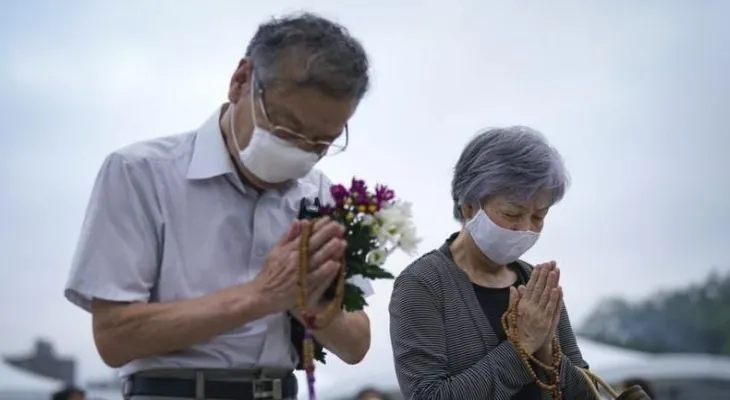Search here
Newspaper
Search here

Arab Canada News
News

Published: August 6, 2023
The Japanese Prime Minister Fumio Kishida on Sunday rejected Russia's hints at the potential use of nuclear weapons, on the day Japan commemorates the 78th anniversary of the United States dropping an atomic bomb on Hiroshima.
About 140,000 people died in Hiroshima on August 6, 1945, and 74,000 three days later in Nagasaki when the United States dropped atomic bombs on the two cities at the end of World War II.
Kishida said during a ceremony held in Hiroshima, "The destruction caused by nuclear weapons in Hiroshima and Nagasaki must never be repeated."
The Prime Minister, whose family hails from Hiroshima, emphasized that "Japan, the only country to have suffered an atomic bombing during the war, will continue its efforts towards a world free of nuclear weapons."
He continued, "The road to this goal is becoming increasingly difficult due to growing divisions within the international community regarding nuclear disarmament and the Russian nuclear threat."
He stressed that "in light of this situation, it is extremely important to promote international momentum for achieving a world free of nuclear weapons."
Kishida's remarks followed a similar stance by United Nations Secretary-General Antonio Guterres, who issued a statement on the anniversary of the bombing condemning "some countries hinting recklessly at nuclear threats once again, and their threats to use this tool of annihilation."
Guterres asserted that "in the face of these threats, the international community must speak with one voice. Any use of nuclear weapons is unacceptable."
The United States believed that dropping a nuclear bomb - after Tokyo rejected a previous peace ultimatum - would enforce a swift surrender without risking American casualties on the ground.
The attack on Hiroshima marked the first time a nuclear weapon was used in war.
On August 6, the United States dropped the first bomb - named "Little Boy" - on Hiroshima.
It is believed that at least 70,000 people died immediately in the massive explosion that destroyed the city, and tens of thousands more died due to radiation-related injuries in the days, weeks, and months following.
When immediate surrender did not come from the Japanese, another bomb, named "Fat Man," was dropped three days later about 420 kilometers to the south over the city of Nagasaki.
The recorded death toll is only an estimate, but it is believed that around 140,000 of Hiroshima's 350,000 residents were killed, and that at least another 74,000 perished in Nagasaki.
The nuclear attack led to a sudden end to the war in Asia, as Japan surrendered to the Allies on August 14, 1945.
However, some critics argued that Japan was already on the verge of surrender, and that the two bombs killed a large number of civilians.
Japan's wartime experience led to a strong peace movement in the country. On the anniversary of the Hiroshima bomb, the Japanese government usually reaffirms its commitment to a world free of nuclear weapons.
After the war, Hiroshima sought to rediscover itself as a city of peace, continuing to promote global nuclear disarmament efforts.
The first nuclear bomb in history that changed the world
The bomb was nicknamed "Little Boy" and is believed to have an explosive power equivalent to 20,000 tons of TNT.
Led by pilot Paul Tibbets, a 30-year-old colonel from the state of Illinois, the mission to drop the atomic bomb was carried out.
The final target was determined less than an hour before the bomb was dropped.
At the time of detonation, the temperature at the bomb's explosion point was several million degrees.
The explosion generated a massive shockwave that destroyed buildings.
Thousands of people on the ground were killed and injured immediately.
Comments